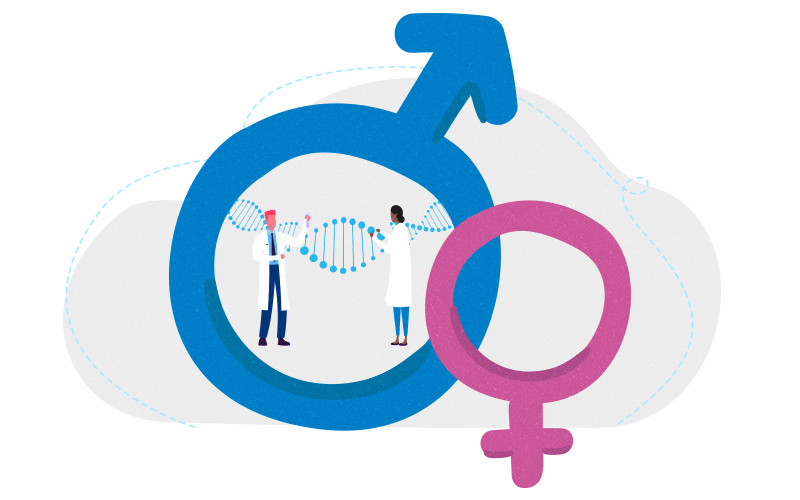Genetic risk factors for PCOS act independently of ovarian function

It’s estimated that as many as 10 percent of women have polycystic ovary syndrome (PCOS), a hormonal condition that produces symptoms such as infertility, irregular menstrual periods, and excessive body hair growth. Women with PCOS are also at increased risk for cardiometabolic dysfunction, as evidenced by insulin resistance and obesity.
Yet, despite extensive studies of PCOS, endocrinologists lack a firm understanding of how it originates. It has been long believed PCOS is primarily a disorder of the female reproductive endocrine system. However, other research has found that male first-degree relatives of women with PCOS also have higher rates of cardiometabolic disease, suggesting that the underlying genetics can be shared between men and women.
Aiming to learn more about the causes of PCOS, Jia Zhu, MD, in Boston Children’s Division of Endocrinology, and her colleagues used a 2018 study on PCOS in women as a springboard to calculate a PCOS polygenic risk score (PRS) for 176,360 men who shared health data with the U.K. Biobank. They studied the genetics of men, she says, because finding the determining causes of PCOS has been complicated. And because men don’t have ovaries, it is possible to isolate the effects of genetic factors for the condition outside of the female reproductive system.
Genetic risk factors linked to PCOS in women and men
The research team evaluated connections between the PCOS PRS, body mass index (BMI), cardiometabolic conditions, and androgenic alopecia (male-pattern baldness). They included the latter two because increased BMI is a well-known risk factor for PCOS and cardiometabolic diseases, and PCOS has been linked to male-pattern baldness.
After analyzing the data, the team found that the genetics of PCOS can manifest as PCOS-related disorders in men: Men who had a high-risk score for PCOS had increased risk of cardiovascular disease, type 2 diabetes, male-pattern baldness, and obesity. For example, they observed a 9 percent increase in the odds of obesity for every one standard deviation increase in PRS.
These findings show that genetic risk factors for PCOS can act independently of ovarian function. “This has primarily been thought of as a women’s disease,” Zhu says. “Our research shows that genetic risk factors for PCOS can cause cardiometabolic dysfunction and hyperandrogenism in both men and women.” Further research on the biological mechanisms underlying these associations are needed, she adds.
The findings were published in the Journal of Clinical Endocrinology & Metabolism.
Potentially getting ahead of PCOS with targeted treatment
There’s already hope that a new understanding of PCOS can shift treatment from limited management of symptoms to targeted treatment of specific underlying causes. This could potentially improve health outcomes for women and men and decrease the health care costs of diagnosing and treating the condition, which one study estimated at $8 billion in 2020. As it stands, women with PCOS are encouraged to modify their diets, exercise more often, or consider surgery, steps that aim only to manage symptoms.
Approaching PCOS through the lens of genetics could also help pediatricians identify children at greatest risk of the adult-onset disorder and provide targeted preventive counseling. “Genetics makes it possible,” says Zhu.
Learn more about the Reproductive Endocrinology and PCOS Program or refer a patient.
Related Posts :
-

Can we harness intestinal cells to treat endocrine disorders?
Enteroendocrine cells punch above their weight. Comprising just about 1 percent of intestinal cells, they produce, as a group, around 15 different ...
-

Charting a new path for pediatric thyroid cancer treatment
Thyroid cancer is the most common type of endocrine cancer in children. Because it is bilateral — affecting both sides (...
-

Huge sequencing study links rare DNA changes to type 2 diabetes
Type 2 diabetes is a complicated disease influenced by genetics, lifestyle, and environment. Now, an international consortium of scientists has uncovered ...
-

Endocrine-oncology treatment helps teen with rare genetic condition
Felicia Walbridge has long been interested in biomedical engineering and plans on majoring in the field during college. Until recently, ...





